Catching That Flying Pig: From Shared Bikes to (Over)shared Power Banks| China Buzz Report


“Successful business is all about finding the right wind. Standing towards the wind gap, even a pig can fly.”
-Lei Jun, founder of Xiaomi Inc.

In 2015, Lei Jun, Xiaomi’s founder and CEO, first spoke about his wind gap theory in a public speech. The rationale behind is pretty simple: with a clear identification of market opportunities (aka the wind gaps), everyone stands the chance of creating a successful, money-making business ("even a pig can then fly!").
After Lei's speech, Chinese tech medias immediately jumped on the bandwagon and to buzz about finding the next wind gap/flying-pig business. Very quickly, these two terms became the language to talk about start-up success in China: conversations between investors, entrepreneurs or just random observers would always involve some mentioning of the wind gap: from E-commerce, O2O, live-streaming to now the sharing economy, each was identified as wind gap of the moment and then quickly ditched.
The problem is, wind is unpredictable, and even with enough wind, not every pig could fly.
Having heard enough noise about sharing economy being the wind gap of the moment, me and Yan decided to get out, try and review some of the trending "sharing-" businesses created by Chinese startups. We are curious about whether we’d hunt a potential flying-pig, but more importantly, we see this as a quest to explore a fundamental question:
Are these new businesses truly making human life better, or are they simply constructing unnecessary needs to drive a technology-fueled, media-hyped capitalist bubble?
But first, let’s see what we could catch.
Bike Sharing: Yes, We Are Late...
“Sharing Economy is a relatively fluid term including businesses that depend on technology connecting people who need a particular service or product with somebody else who has that service or product available. Sharing-economy businesses favor accessibility over ownership. The most popular examples in the U.S. include Airbnb and Uber, but in addition to lodging and transportation, the sharing economy also includes the exchange of knowledge, skills and production capacities.”
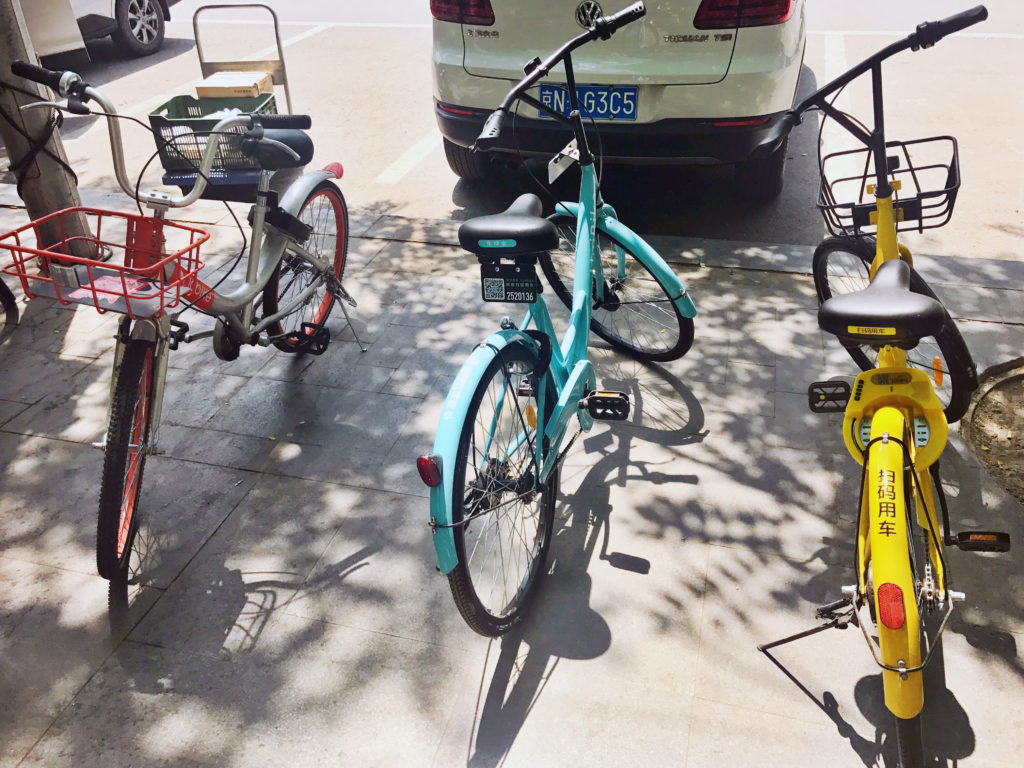
May 9th, 10:00 am.
After meeting at my place, me and Yan headed out to hunt for bikes, and we immediately spotted these three little guys standing next to each other: one orange, one blue, and one yellow. Hum. Decision time.
Since this is our first time trying out shared bikes, we decided to go with the two companies currently with the largest market share - ofo and Mobike.
 Yan: So who takes which?
Yan: So who takes which?
 Me: Can I take Mobike? apparently it can be used directly through WeChat’s mini programs so I don’t have to download another new thing from the App Store…
Me: Can I take Mobike? apparently it can be used directly through WeChat’s mini programs so I don’t have to download another new thing from the App Store…
 Yan: Finee.
Yan: Finee.
 Me: Let’s switch bikes half way so we’d each get a taste of both and then compare!
Me: Let’s switch bikes half way so we’d each get a taste of both and then compare!
 Yan: Fineee. (busy downloading ofo from the App Store)
Yan: Fineee. (busy downloading ofo from the App Store)
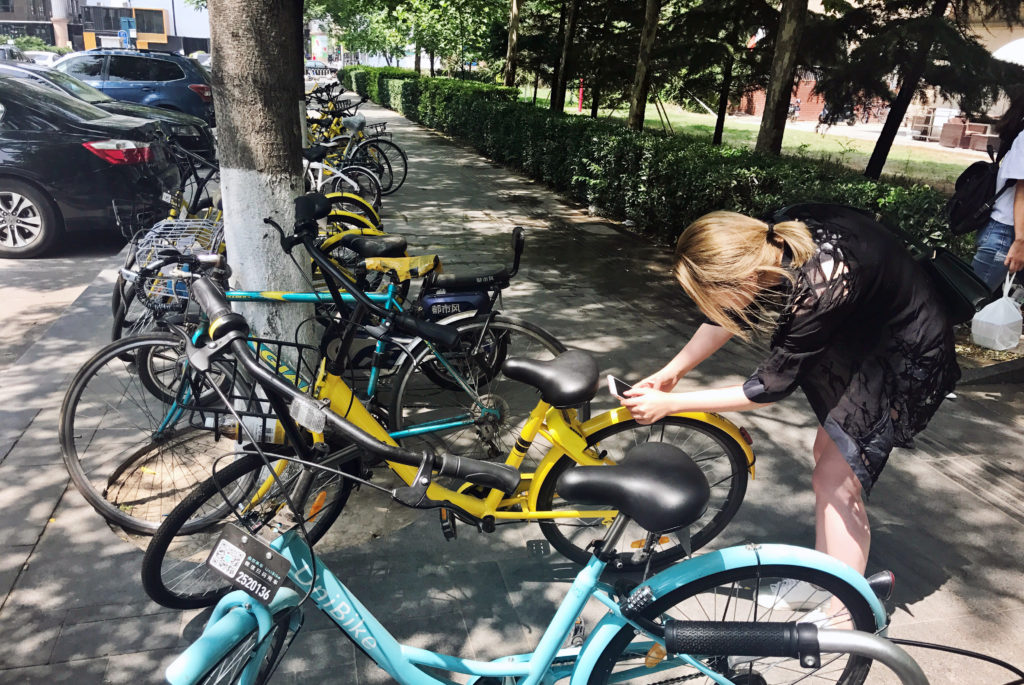
Unlocking Little Yellow...
 Me: Sh*t 299 rmb for deposit? That’s freaking expensive...
Me: Sh*t 299 rmb for deposit? That’s freaking expensive...
 Yan: ofo’s deposit is only 99, too bad, you made the choice!
Yan: ofo’s deposit is only 99, too bad, you made the choice!
As first-timers, it took us about 5 minutes to sort out the software (even though Mobike can be accessed directly through WeChat, you still need to register, confirm your phone number and locations etc before anything else), then to the magic moment: holding your phone straight to the bike’s QR code, wait until you hear a beep from the bike lock as it rotates, and ta-da, off you go!
But wait...
 Me: Sh*t my bike doesn't work. The lock isn’t reacting.
Me: Sh*t my bike doesn't work. The lock isn’t reacting.
 Yan: (Getting on bike) Too bad boooo! Byeeee!!
Yan: (Getting on bike) Too bad boooo! Byeeee!!
And then she was gone.
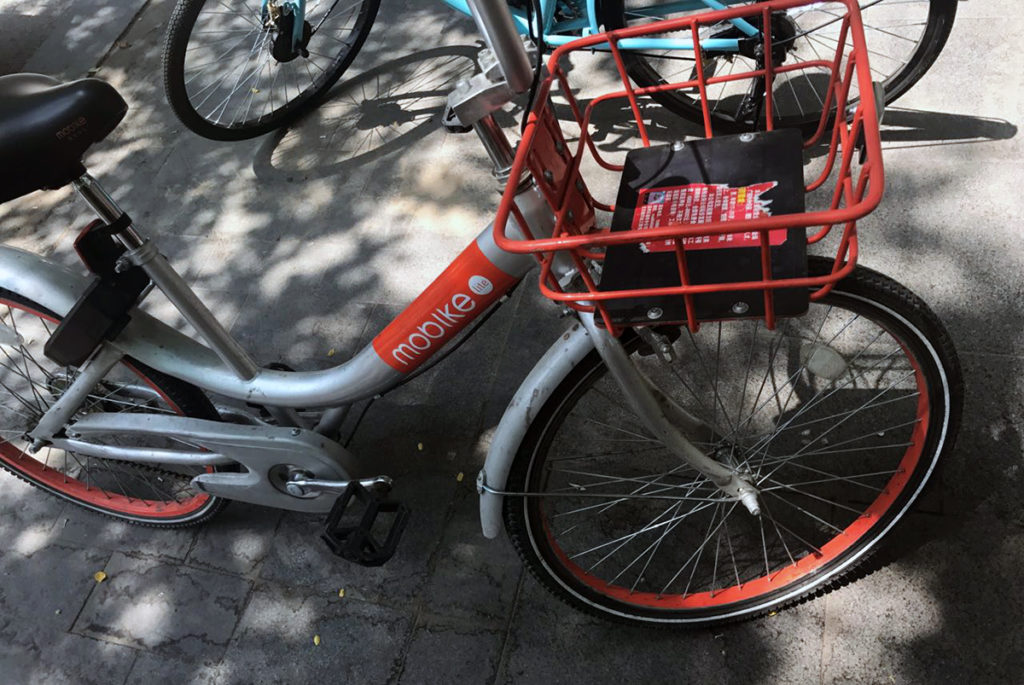
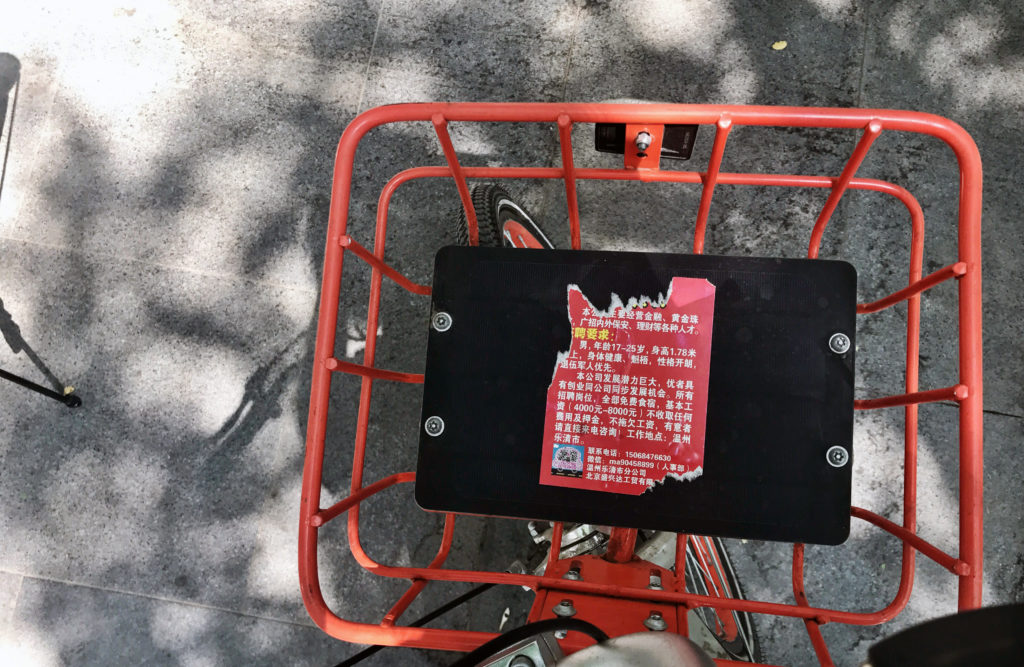
My little Mobike (with some random ad flyer stuck inside)
Just kidding.
My little orange buddy was finally unlocked after 3 times of saying “system error”. I got my ass on the mobike and caught up with Yan, who seemed to be already getting along with her yellow ofo bike.
30 seconds later, I realized there’s another problem: my bike seat was too high. I got off, squatted down trying to screw the seat, but it didn’t loosen up at all. Never mind, our planned ride isn't that long anyway, this should be tolerable.
 Yan: How are you feeling?
Yan: How are you feeling?
 Me: All good except the seat…Little Orange is surprisingly easy to ride! How’s yours?
Me: All good except the seat…Little Orange is surprisingly easy to ride! How’s yours?
 Yan: It’s pretty heavy to paddle, my leg muscles are working hard…
Yan: It’s pretty heavy to paddle, my leg muscles are working hard…
 Me: Let’s ride till the next crossing point and shift gears!
Me: Let’s ride till the next crossing point and shift gears!
(5 minutes later)
The moment I got on Yan’s Little Yellow, I realized she was right - comparing to Mobike, ofo’s yellow bike feels heavier and takes some extra energy to work with. But other than weight, everything else feels pretty much the same.
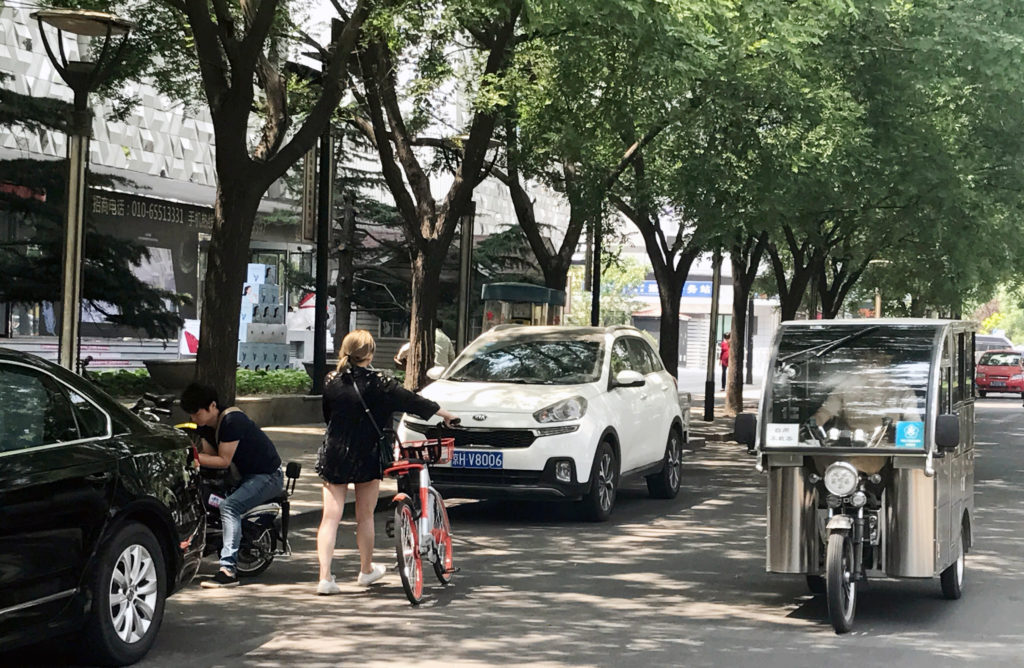
Paparazzi from behind!
We arrived at our planned destination, Youtang Mall in about 20 minutes. After traversing through a section with extremely bumpy roads and chaotic traffic, by the time we saw the mall, both of us were sweaty and desperately craving for an ice-cold diet coke.
And then we bumped into a dilemma for parking.
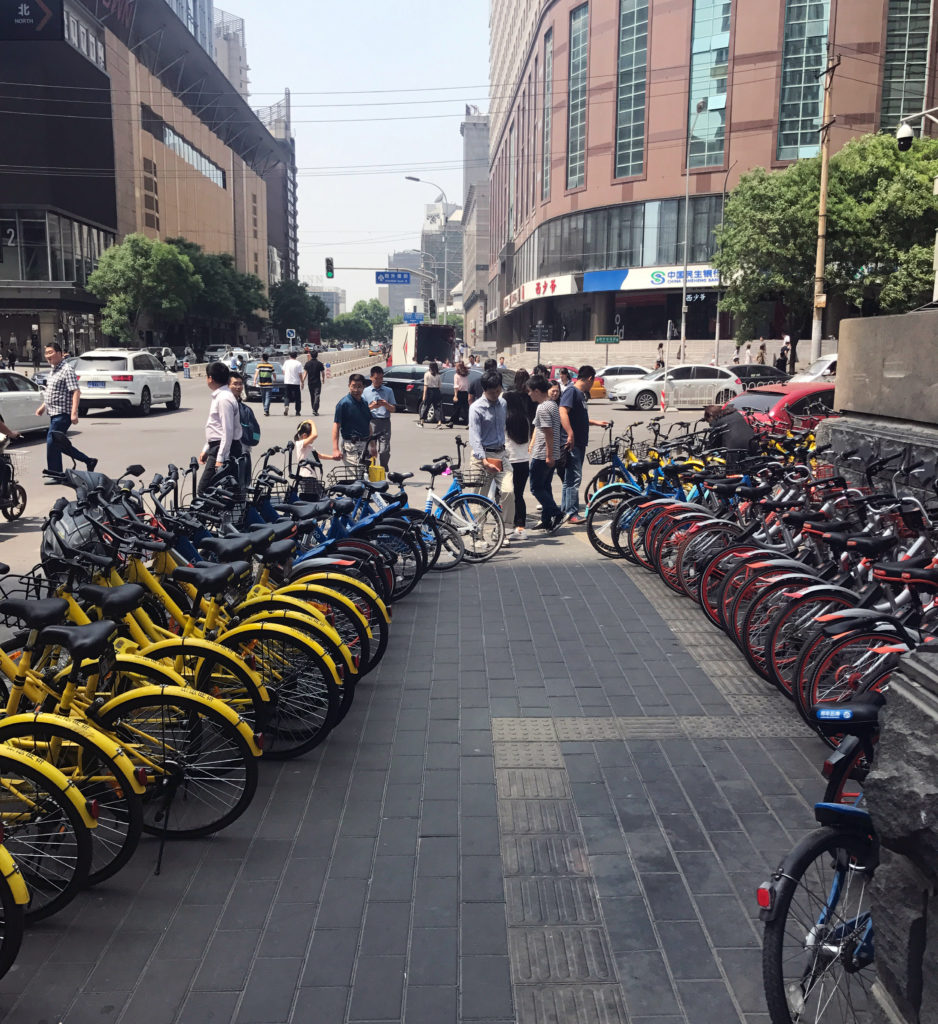
Right before approaching our destination, we spotted an area covered with colorful bikes. Their organized manner seemed to be indicating that this is a permitted, or at least publicly managed area specifically for parking shared bikes. The problem is, it is also clearly occupying a large section of side-walk for pedestrians.

As you’d probably heard by now, one of the coolest thing about China’s shared bikes is that you can leave them everywhere as long as it is in a legal, public area (no private compound for sure). But the overwhelming number of bikes in Beijing has created many awkward areas like this: a shared-bike slumber party that looks kind of organized, but is reality, is missing instructions for management.
Is it more appropriate to park here along with all the other bikes, or shall we find a quite, random spot and leave our bikes there?

Decision time: where shall we leave our bikes?
In the end, we decided to find a relatively remote spot at the edge of this bike-loaded zone. We are still not sure whether we parked at the “right place”, but at least it didn’t seem to be blocking anyone’s way given the already pretty narrow pedestrian path.

Good-bye Little Orange, thanks for the ride!

Our rides as shown in ofo (left) and Mobike (Left)'s apps.
We were hooked. Why didn’t we try shared-bikes earlier?
Our first experience with shared-bikes were clearly not perfect given Beijing’s perilous road traffic, the confusions over parking and the many hardware bumps we encountered. But riding on these colorful bikes, even just for the first time, really gave us an opportunity to see the city in such a way that cars, subways or even walking isn’t able to let us see - after all, you really have to completely focus on what’s around you when riding a bike.
It brings back both the convenience and the fun element of hassling through the city’s small allies, while eliminating the major worry of getting bikes stolen. Honestly, from purely users’ perspective, we think bike-sharing is an awesome invention for at least a city like Beijing.
The Number Speaks
- According to public data, bike-sharing companies in China has financed over 3 billion yuan (over 429 million dollar) by the end of 2016, among which Mobike and ofo account for the majority of funding of the entire industry.
- To date, Mobike has in total raised over 600 million dollars by 19 investors, whereas ofo has raised over 750 million dollars by 15 investors.
- In March 2017, Mobike collaborated with the mini program of WeChat, allowing WeChat users to rent bikes without downloading the app. The effect turned to be outstanding - within merely a month it has gained 24 million new users, and its MAU has grown to be 200% of what was last month. The newest report "2017 Q1 sharing bike research" by Sootoo Institute shows that Mobike's market share has grown to 56.56%, advancing the second (ofo) by nearly 30%.
Power Bank Sharing: Seriously, Why?
Given the hype over shared power banks over the past two weeks, we thought we’d find them everywhere already. But in reality, it took us two days to hunt down this little guy - a mobile power bank sharing machine in the reception of a KTV in Sanlitun, locating at the basement of a shopping mall.

Like every Chinese tech business, it starts with scanning the QR code (through WeChat), confirming your identity and, shockingly, paying a 99 RMB deposit. (Come on, 99 RMB for such a tiny little thing, you kidding?)

Once registered and paid, the system, which existed as a mini-program inside WeChat, will ask for your phone type (Apple or Android) and exerts the correct power bank from one of the docks.


With still more than 80% of battery left, my phone wasn’t particularly in need of a boost. For the sake of our experience though (also for that 99 bucks I just paid…), we decided to carry the power bank to charge my phone till full battery, and kill some time in the mall.
(Holding the power bank while walking around)
 Me: I am not sure how to think about this thing, so far it feels really pointless. Why would people need a particular machine just for portable batteries? Would you need that?
Me: I am not sure how to think about this thing, so far it feels really pointless. Why would people need a particular machine just for portable batteries? Would you need that?
 Yan: I certainly don’t. I had never used up iPhone battery within one day, so never really had the need…
Yan: I certainly don’t. I had never used up iPhone battery within one day, so never really had the need…
 Me: Right, you don’t even own a power bank!
Me: Right, you don’t even own a power bank!
 Yan: And I know you usually carry one that I could borrow anyway, hehe.
Yan: And I know you usually carry one that I could borrow anyway, hehe.
 Me: Exactly, if I knew I had a long busy day ahead requires a lot of phone usage, I’d just bring my personal power bank along for the day. I am pretty sure this is what most people do? Some busy folks I know would either carry their own portable power bank or a charging cable wherever they go!
Me: Exactly, if I knew I had a long busy day ahead requires a lot of phone usage, I’d just bring my personal power bank along for the day. I am pretty sure this is what most people do? Some busy folks I know would either carry their own portable power bank or a charging cable wherever they go!
About 2 hours after renting it out, we returned the power bank back to the station. The returning procedure is hassle-free: you just select Return from its WeChat menu, and push the power bank right into the indicated slot. 2 minutes later, the bill showed up on screen.

The bill came up on WeChat.
2 hours of charging costed a total of 2 RMB, which, to be fair, is extremely cheap. But the thing is, there are tons of decently-made, fancy-looking power banks available on the market already, and many restaurants, cafes, salons or shops would happily lend their customers with chargers or power banks for free. In today's insanely digitalized society, battery power for mobile devices exists like a free public good: although in theory it is not free, as long as you ask, there's always someone or some place that could provide you some at zero cost.

There are endless choices for portable power banks on JD.com.
While returning the power bank, we chatted with the Karaoke bar's reception lady who works right next to the machine. "Some of our customers would take one to use before going into Karaoke," said the lady, "I haven't come across anyone who just come down here for borrowing it and take it into the malls, you two are the first ones I've seen!" 
Photo from: jiediankeji.com/
And perhaps that's the thing. In order to make power bank sharing work (hence the possibility of becoming a flying pig...), it has to be very scenario-specific in term of machine locations. Placing them in subway stations might be a good idea (so you can borrow one, get on your train and charge, then get off and return before you leave the station) , or in entertainment spaces such as Karaoke bars, cinemas or restaurants. But in the end of the day, there's still one single question we couldn't get over with: Why on earth would you need a particular sharing machine for power banks? if you noticed your phone battery is running low, can't you just, you know, keep it away and use it less? (Just focus on that damn movie! or food! or the song your friends are singing...)
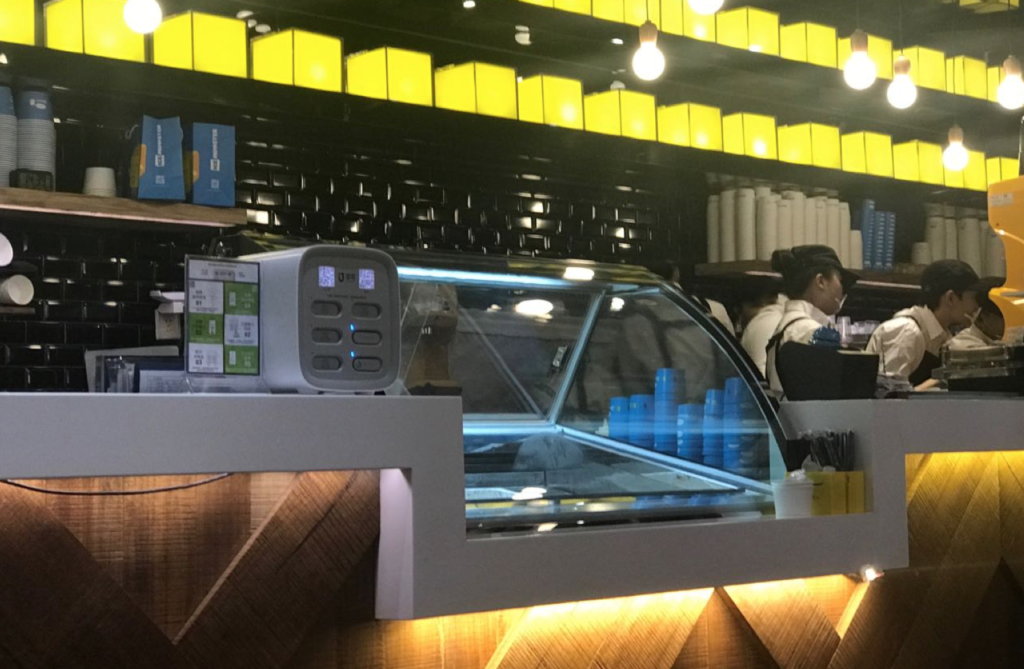
We spotted another power bank sharing machine later in a restaurant and realized there's another problem: if customers borrowed power banks while dining, wouldn't they stay in the restaurant for longer, therefore slowing down the table turnover rate?
We are riding shared-bikes home,
but before that,
let me get back my 99 RMB deposit for that damn power bank...
The Number Speaks
- At least 15 startups in China have joined in the competition for the growing domestic power bank rental services.
- From March 31 to April 10, within 10 days, power bank sharing companies has received about 300 million yuan (USD 44 million) of funding from over 20 agencies. Investors include some of the most reputable Chinese VCs such as IDG and Yuan Jing Capital, as well as well-known individual angel investors.
In the Summer of 2015, after being chased down about his "flying pig theory" by medias, Lei Jun finally spoke up again:
"Yes, I talked about wind gap and the flying pig, but no, they don't mean being opportunist. Successful entrepreneurs must constantly analyze market opportunities and wind trends, but the more fundamental thing is hard work. It takes at least 10,000 hours of training to become successful in any field, there is simply no shortcut to success. So you see, even standing inside a wind gap, only those pigs that have worked hard will be able to fly. "
Looking back to the past 2 years, a lot of incredible things popped up in China's tech world. At the same time however, the obsessive, endlessly talks about wind gaps are also trapping people into a vicious opportunistic cycle. Reflecting upon our personal experiences with these two "flying-pig-to-be" businesses, we couldn't agree with Lei more -
Identifying market climate is important (in particular from the investors' perspective), but as entrepreneurs, you can't just expect to be blown to the sky by luck (and capital). So how about sitting down, figuring out what people truly needs, and then work your ass off to create something that really, really, really matters?


your conversation just so funny!
Hi,I read your blogs named “Catching That Flying Pig: From Shared Bikes to (Over)shared Power Banks| China Buzz Report – Elephant Room: Make China Relatable” like every week.Your story-telling style is awesome, keep it up! And you can look our website about love spells cast.
Enjoyed reading through this, very good stuff, thankyou .
[…] Far from it, he merely got lucky riding on Tencent’s success wave. After all, even pigs can fly when riding on an upward market […]